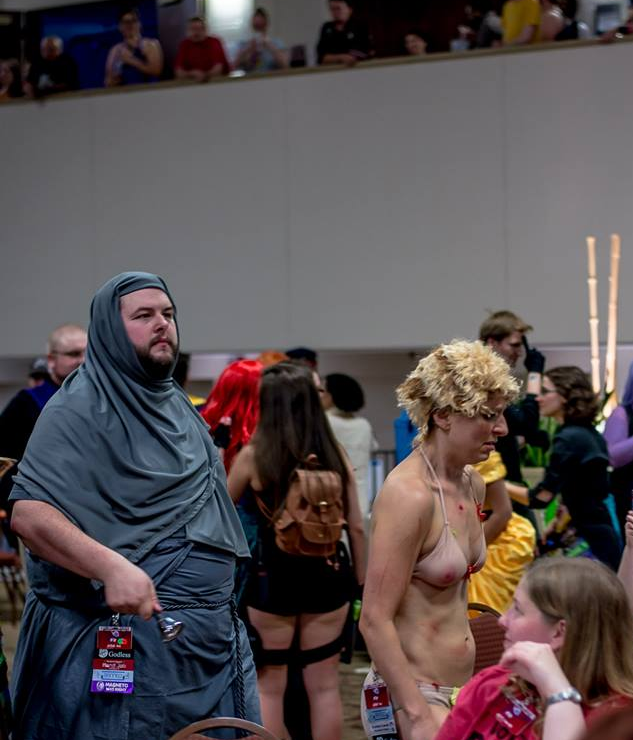Making It: Comic Molly Glover
Rob Callahan chats up improv performer and insult comic Molly Glover: the conversation meanders from comedy and vilification to board games, life on the spectrum, and the occasional perils of cosplay

Some things worth knowing about comic Molly Cathryn Glover, in no particular order:
One, she’s an insult comic. Two, she’s strangely obsessed with goats. (She may even believe she’s actually two goats in a trench coat.) Three, she’s one-third of the crew that produces the long-running atheist podcast, Geeks Without God. Four, a bunch of other stuff we’re skipping over for time’s sake. Five, her day job is making board games. Six, she has Asperger Syndrome. Seven, a bunch more stuff we’ll get to as we go. Eight, I forgot what eight was for…
When I set out to interview her, I actually just want to hear about producing board games, so I meet up with Glover at the site of her day job to talk about those. We branch out a lot from there though, like you do, but there’ll be more on that later. For now, let’s focus on games.
Last year, Glover moved to the product development department at Fantasy Flight Games. She’s since worked on a number of games, most of which she can’t discuss at this time. She can talk about Android: Mainframe, though, as well as Mafia: Vendetta. In the former, cybercriminals compete to seize control of Titan Transnational Bank’s computers. In the latter, innocents and incognito crime bosses face off amid a mysterious murder spree.
Before producing games, she worked at the same company, but in sales. Her shift to product development was a wide lateral move to make, so as we’re sitting there chatting, I can’t help but ask why, and she answers quite frankly.
“Depression,” she says. “I got really depressed in my job. I just started to not enjoy coming to work anymore. It wasn’t so much that I didn’t like what I did, but I didn’t feel like I could grow. And I didn’t want to be a sales manager, so there was nowhere else for me to go with it.”
“It’s a long process,” she says, noting that the change in jobs took eight months. “It does not happen often at all. In fact, they greatly discourage it.” Still, she saw no other option than to try. Before the move, Glover was applying at other companies where she hoped to find more opportunities to grow. Those didn’t go well.
“I went on one interview to do copyediting, proofreading stuff, and the place was a corporate nightmare. There were three women who interviewed me that were, like, glossy, and they were really rude. When they asked what I did for fun and I said I worked at a Renaissance festival, they said, ‘Oh, like for money?’”
Realizing she’d become accustomed to the less soul-crushing culture at Fantasy Flight, she considered her options. She could stay where she loved the environment, and stay unhappy, or she could try to find happiness while drowning in a sea of pastel button-downs and dead-inside smiles. Neither option worked, so she sought a third. Third option achieved, Glover celebrated her five-year anniversary with Fantasy Flight Games on Valentine’s Day, and her visage is soon to grace the artwork in an upcoming Fantasy Flight game of her choice. “I don’t know which, though. I have to choose. I’m probably gonna go Game of Thrones, because that’s one of my favorite fandoms,” she muses. “Maybe I’ll be some sort of goatherd in Game of Thrones.”

All Wrong for All the Right Reasons
We talk a bit longer about the games, eventually getting onto the topic of media coverage, then quickly onto the topic of mistakes in media coverage. “I have had the experience where someone is talking about my game,” she says, referring specifically to an online article about Android: Mainframe, in which the author got a few facts wrong. This confounded Glover, who grew ever more frustrated as she read it. “I was like, ‘No that’s not right. That’s not what happened! That’s not…’ Hmph! I mean, they read the same article everyone else did,” she recalls. “They didn’t call anybody. Just read the article, drew some assumptions and put it up on their website.”
Then she adds, “I’m actually used to bloggers taking their source material from…”
Her hesitation marks our conversation’s first point of peregrination: We’re both poised for a deep talk about the nuts and bolts fallen loose from the journalism machine in its broadly dysgenic decline toward web content, (and from there, toward shameless clickbait,) and how anyone – from your average working stiff to the most world famous celebrity – is a potential target to be trashed for the sake of ad impressions. We’ve both got opinions, each for our own reasons.
Neither of us really knows how to broach this topic. It seems hard for her, perhaps harder with someone like me around than with anyone else: I’m an arts & culture writer, so I represent an institution that’s put her through the wringer. (See above, re: trashing people for ad impressions.)
Unsure of what else to say, I meet her hesitation with a single, earnest question: “Can we talk about TheMarySue?”
“Yes, please,” she answers.
This is a long story, perhaps best summed up as that time a blogger at TheMarySue.com picked Glover up and shook her around like a viral chew toy. A slew of personal attacks followed on social media, because that’s kind of how the internet works now. The details are probably best left to her own words, which she’s glad to provide after only the slightest prompt. In fact, she sheds her hesitation like a Lannister matriarch’s clothes.
“My husband and I, and our friend Laurie Richardson, we all go to CONvergence,” she says, “which is a local geek convention here. It’s kind of a party con, lots of cosplay, costumes. We always do costumes; I like to do funny costumes, and just like two weeks before CONvergence was the Game of Thrones episode with the Cersei shame walk. Where (spoilers) she’s stripped naked and they cut off all her hair and she has to walk from the Sept all the way down to King’s Landing. People are throwing garbage at her, and ‘Booo,’ and ‘You whore,’ and all that. Because it’s a shame walk.”
Glover describes her cosplay recreation of the shame walk in gleeful detail, as is a cosplayer’s wont, starting with the garment she wore, known as the TaTa Top. “It makes it look like you have naked boobs,” she explains. “It’s in protest of women not being able to show their nipples, but men can. So, I put that on, and underwear, and a cabbage leaf over my crotch, and I took a crappy wig and cut all the hair off so it looked like short-short hair, and then I did some bruising and kind of like a little bloody makeup; I think I squished cheese wax onto me to make it look like tomatoes had been thrown, and I put lettuce in my hair.”
“We decided we would do this walk from one end of CONvergence to the other, and we would just slowly make our way, not breaking character, not reacting, just whatever happened would happen. If people yelled, or screamed, or ignored us, that was fine. All of us consenting, totally fine.”
Not everyone was totally fine, though. A few days later, another CONvergence attendee brought the incident up on a Facebook group, saying that the performance had triggered an acquaintance. From there, members of the group tipped off TheMarySue, calling for an article to condemn Glover’s costume.
“I guess they were triggered about the time they had to walk from the Sept to King’s Landing with the septa,” Glover snarks before adding, in a more sincere tone, “I don’t mean to make light. I mean, genuinely, I know some people have PTSD. They get triggered by things, and that’s fair. We all get set off by different things.”
“My dog recently died at the time,” she says, choking up a bit, “and his name was Ein, and I went into the dealers’ room and saw a bunch of ‘Cowboy Bebop’ merchandise and started to cry, and left.” She stresses the last word, adding, “I didn’t try to get the dealers’ room shut down.”
“Which is what these people tried to do to me,” she recalls. “They wanted me banned from CONvergence. They wanted me officially censured—and it was always me. It was never us. Not me, Nick, and Laurie. It was me. I was the problem.”

“There was something like an 800-comment thread on Facebook about it, and then someone reported it to the MarySue, and the MarySue decided to write an article about what happened without ever talking to me or Nick or Laurie. But they talked to the people who were our detractors, and referenced the Facebook comments as their source. So they ‘quoted’ me in their article, but they quoted my Facebook comment to someone else and didn’t…”
She trails off again, perhaps triggered herself. It’s difficult to imagine what a broad, public bout of institutional cyber bullying feels like unless you’ve been through one. Even then, no two times are necessarily the same. Some might argue that you can just “turn the computer off” and “walk away” from that kind of online abuse. Sometimes, for some people, that might work. But it isn’t necessarily an option when you’re on the autism spectrum. In that case, you might not come naturally by the tools to work with a world in which hundreds or thousands of strangers are suddenly calling for your head.
She shakes it off, though, and regains her composure enough to sum it all up succinctly with, “Yeah, it was rough. I was upset.”
Anything can be funny. There are just some things that have higher risk. You know a rape joke is higher risk, racist jokes are higher risk—so you better make it a joke about rape, or a joke about race, as opposed to a joke where the victim is the butt of the joke.
Even Insult Comics Get the Blues
No one involved with the article, or with the insult carpet-bombing that followed, ever took a step back and said they may have taken things too far. No one offered Glover an apology, but one was roundly demanded of her.
“Later,” she says, “I wanna say two months later, CONvergence put a public apology forth, because people said it violated the ‘safe space’ policies.” Glover, however, never apologized. She never understood that demand, especially when, just days later, no fewer than six Cersei cosplays showed up at the San Diego Comic-Con, running the gamut on taste and decency, and nobody typed a single negative word.
But she’s not holding out for any apology, and she explains that the same standards apply to herself as to her audience. “As an insult comedian, I have this thing that you don’t have the right to not be offended,” she says. “So that’s you. You need to make your bubble that.”
Glover says she became an insult comedian after watching her husband perform with Vilification Tennis, and then deciding to try out herself.
“Vilification Tennis is ‘Your Mamma’ jokes,” she says. “Basically, the Dozens. Like, ‘You’re so fat… You’re so stupid… You’re so ugly…’ It’s like doubles tennis: insults get lobbed back and forth, and there’s a judge who, when he thinks an insult is particularly good, scores a point and then it resets with a new serve.”
“We do a show at CONvergence every year,” she says. “Mainstage is always completely full. The overflow room is full. People line up for an hour-and-a-half before the show to watch it, to get a seat. It’s really humbling.”
“We, all of us, have had lots of conversations about comedy theory, because that’s what comedians do when they get together: talk about comedy theory to jerk each other off. …We’ve had lots of conversations about whether there’s anything that’s not okay,” she says. “[But] anything can be funny. There are just some things that have higher risk. You know a rape joke is higher risk, racist jokes are higher risk—so you better make it a joke about rape, or a joke about race, as opposed to a joke where the victim is the butt of the joke.”
We talk more at length about Dave Chappelle and Louis C.K., and how they’ve accomplished this very feat via carefully crafted deliveries and complex setups. It’s not something everyone can do, though, and even a seasoned professional can miss their mark. Hence the risk. “We’ve made jokes where people have walked out of the theater,” she admits. “I have two friends who won’t come see us anymore because someone made a holocaust joke, and she was, like, ‘Nope.’”
“That’s cool,” she says, “and that is the right response. You leave, and now you say, ‘That’s not for me.’ You don’t say, ‘This shouldn’t be allowed, this should be banned, this should be censored.’ I think we’re all responsible for censoring our own inputs, as it were. If you don’t like it, just don’t go.”
“Obviously, there’s a spectrum of people getting offended,” she adds. “For some people there’s the idea that ‘nothing offends me, nothing should offend anybody,’ but that’s very outlier. And then some people get offended by everything, and that’s also an outlier. But I feel like most people are like, ‘I like what I like, and if you do something I don’t like, I don’t really care. I just won’t go.’”
“But there’s this new, growing thing,” she says, “of people who feel like, not only should a thing they don’t like… not only should it be where they don’t have to see it, but it shouldn’t exist. They don’t like the idea that we live in a world where it exists. And to me that’s a bit much.”
Neurotypically Speaking
“When the MarySue thing came out, I cried helplessly for about 30 minutes,” she says, reiterating that the concept of offense isn’t wholly lost on her. If anything, it can hit her harder, longer, and with more lasting impact than your average neurotypical might abide. “I was crying to Nick. I was saying, ‘I don’t understand, I didn’t want to hurt anybody, these people are saying that I genuinely caused them harm, and it was just for fun, and they’re saying such mean things about me…’”
Again, her voice wavers. Again, she pauses a moment, then she recovers with a slight change of tack.
“The hardest part for me, being on the spectrum, is constantly not knowing if what I’m doing is socially acceptable,” she admits, “or if I’m really upsetting someone. I have this constant worry that someone’s really mad at me, but they aren’t showing it on their face, ’cause they are a regular person whose face can hide what they’re thinking. And so, I ask my husband a lot if he’s mad, and he’s very kind. He knows I’m not trying to be passive aggressive. I’ll be like, ‘Are you mad at me?’ and he’ll be like, ‘Nope.’ And then I’ll mimic his face, ‘Okay, cause your face is doing this thing,’ and he’ll say, ‘That’s just a face people make.’ And I’ll be, like, ‘What would your face look like if you were mad?’ And he’ll show me. [Figuring it out, for me, is] like trying to remember what peoples faces do when they’re mad.”
Although Glover does worry that she talks about being on the spectrum too much, she also says that’s a good way to help others understand. “It’s such a good shorthand,” she says, “especially now that people know more about autism, and Asperger’s in particular, to be able to say, ‘Oh it’s this. This is why.’ And now I have moved from ‘annoying’ in their head to ‘annoying, but I get it.’ It’s not as if I’m playing a card. It’s just, like, I will try; I’m all about self-improvement. I’m not like, ‘This is who I am, and deal with it.’”
“I fully am aware that I am not always awesome,” she admits, “and I would just prefer people tell me that rather than make passive aggressive comments that I don’t understand. Why are you saying that if what you mean is this? I don’t get that at all.”
Affective fluidity flows both ways, though. When I observe that Glover’s dry, deadpan delivery oft belies the absurdity of her humor, she’s quick to agree. “Nick and I have that problem,” she says. “We have such a rapport; I feel like most of the time we’re alone together, we’re doing bits. We’ll have this happen in front of other people, even friends who know us, and they can’t tell if we’re fighting or not.”
“It’s like a one-upmanship of completely serious dry humor, with, like, no joking face or anything.”
I offer a comparison to the rapid-fire repartee of His Girl Friday. She one-ups me with Nick and Nora Charles, then two-ups me with Tracey and Hepburn. She’s poised to keep going, but I’m no natural banterer, so I humbly cede to Glover’s keener wit before we Gilmore Girls our way into a tangent barrage of Dante/Randal proportions. The conversation doesn’t end then and there, though. We talk for a span more, wherein she mostly focuses on what she loves about her husband—whom she doesn’t just love, but whom she’s taken along on so much of her comedy career.
Along with husband Nick and co-host Tim Wick, Glover just wrapped up her 200th episode of Geeks Without God. Stage personae “Beefcake and Olive” (Nick and Molly Glover) will return to the Minnesota Renaissance Festival in August, and her comedy improv duo “Kittenbritches” was busy coaching a young hopeful for Vilification Tennis tryouts in late April.